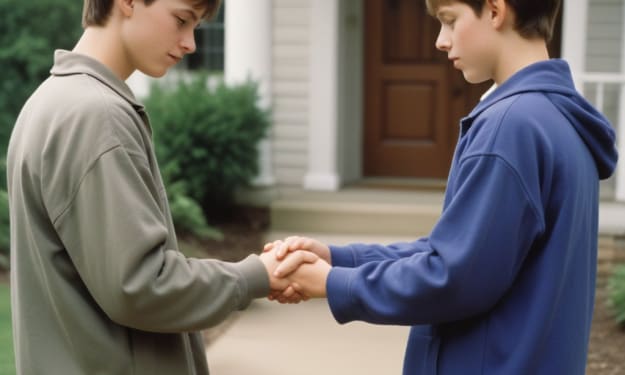I Don't Want To Play
This game is not for me

When I say I don't want to play, it's sometimes interpreted as "I don't want to play anymore." A common enough statement for a lot of people, they tried and now they would like to be done please. That's not what I mean.
Certainly, when I was younger, I think I wanted to play the game. I wanted to be involved and interested and invested. I don't remember wanting to play, but I think it must have been so. Now, though, I don't.
I don't want to have to care. About what? About it all. I don't want to be involved, I want to be able to, at any time, say, "nope. That's it. I'm done." But please don't think I mean anything permanent that would land me in a crypt, I want to live I just don't want to play the game.
But what game is that? The game we all play, every day. The game called life as defined by the existence of a society. The rules of which are always changing, always in flux; even the ones that aren't what I struggle with.
Some rules are fine. Some changes are good, even. Some changes I could not care less about if I tried. Others are more unpleasant to me, they drive my thinking down paths of longing for an amount of isolation from it all. A desire to get a comfortable cabin on a mountain, hopefully where I can catch a glimpse of the sea on a clear day, and hide from it all, the whole of the game and everyone playing.
Of course, that's not realistic. I can't escape the game until the same exit condition as everyone else is reached. And as I said I don't want to do that. Thus at the geriatric age of twenty-four, I'm left in a tragic state, if I may be allowed a moment of self-pity. Because... I don't want to play.
I don't want to care how people interpret what I say. I don't want to worry about how best to talk to them so that I get my point across. I don't want to think about things from their perspectives or levels of knowledge if theirs is different to mine. I don't want to think about elections, or the frustration of cast ballots. I don't want to avoid the three big taboos of conversation.
Naturally, I could whine for an age about what I don't want to do. I, along with most other people, have had a lot of experience with that since childhood. Everyone I know has, over a drink or ten, complained at length to their friends about something that bothers them. But I'm bothered by it all, and I don't want to play.
Alone, away from the world and its concerns is where I want to be. But then, it's not. I don't want to play but I want the benefits of the game. I want people to read my stories; I want them to listen to what I have to say; I want to have friends; I want to be challenged; I want to want to engage with the world.
I want to want to play.
When asked what I studied in school, I always answer honestly. I say that I studied philosophy and I endure and engage with the light-hearted ribbings that follow. Yes indeed, I picked a hard one. Yes it is nearly impossible to get a job. Why no, I had not heard that they recently opened a philosophy factory, perhaps I should apply. But studying thought, rhetoric, and logic for five years leads to some difficult facts. At least, it does if you do it right.
Friends and family will ask me a question, a question that for a person who did not study epistemology would be complex enough. But for us, the unfortunate few who like taking apart arguments to see how they work, it's all so much more complex. And that complexity is not helped by the fact that most people are not thinking along the same lines as we are.
Worse still, generally we philosophers don't like each other much. We tend to be a pedantic and difficult crowd; sometimes described as everyone's least favourite person at a party.
Today, the day that I write this little article, I got into an argument with my dad because we were discussing whether or not something was logical. And technically, on the plain where I engage with the discussion, yes. Perfectly and completely, a logic structure can be constructed to justify and support both sides of the argument. The structure of one side isn't sound, mind you, and it's simple enough to disassemble, but logically it works.
Simple enough, if you spent two years studying semantic logic, I mean.
Not so, cried my dad. The argument was illogical because the average person would not see it that way; given that my own education is required to understand why and how the logic works, it therefore doesn't to most people. If X, then Y. Q.E.D.
As people are wont to do, we fought. And ultimately, I had to acknowledge that he was right. In standard language (I don't say common because that implies my holding myself above, which I am not doing) the argument under examination was not logical. And I fumed over that.
I suddenly recalled that I. Do. Not. Want. To. Play.
Sadly I don't really get a choice. I have to put up and shut up. Grin and bear it. Find the silver lining. Because, there are options. At any point I can, quite literally, opt out of playing. But I'm not willing to do that because, as much as I do not want to play, I do not want those alternatives.
As I said earlier, I want good things. I want friends and fun and travel and excitement. I don't want to live in a shack in the mountains, alone with my thoughts until I come back into society like Nietzsche's madman. I don't want to jump off the planet. I don't want to play because trying to play causes me, has always caused me pain, but I want the benefits.
So I keep on trying. I try to play as little as possible, I don't discuss certain things with certain people. Despite how much joy the activity can bring me, I've added philosophy to the holy trinity of things not to discuss at Thanksgiving dinner. Because the costs of the game are too great.
Not to say that I don't enjoy myself. My life is, thankfully, free from the daily torment of many others. I'm safe in my community, well fed, and well loved by my friends and family. Sadly, there is the rest of the world out there that I have to learn to get along with.
I have to engage with people how they are best engaged with. How they can and want to be engaged with because I have the ability to change. I can speak in one way with one group, and raise or lower the bar to fit others. I have to play the game because I can, and I want what the game gives me.
But much like the child evoked by my first statement, my declaration that I don't want to play, just because I have to do something, that doesn't mean I have to like it.
Thank you for reading.
- Alex :)
About the Creator
Alexander McEvoy
Writing has been a hobby of mine for years, so I'm just thrilled to be here! As for me, I love writing, dogs, and travel (only 1 continent left! Australia-.-)
I hope you enjoy what you read and I can't wait to see your creations :)






Comments (3)
Sometimes it'd very difficult knowing more about something. It doesn't always make things easier or better. 🤔
Interesting thoughts. I can't say that I fully relate: as a teacher of over 25 years, I always want to play, even when I really don't to. The long summer and winter breaks help. But I am glad to see that you want to play enough not to completely check out. Life's fascinating and every game match is food for stories.
An interesting perspective, understandable really, and I can't say that I don't feel the same way in my bones many times. The consequence of being more introverted, perhaps INF-J, is that we see things differently. Well done!👏Pernoste